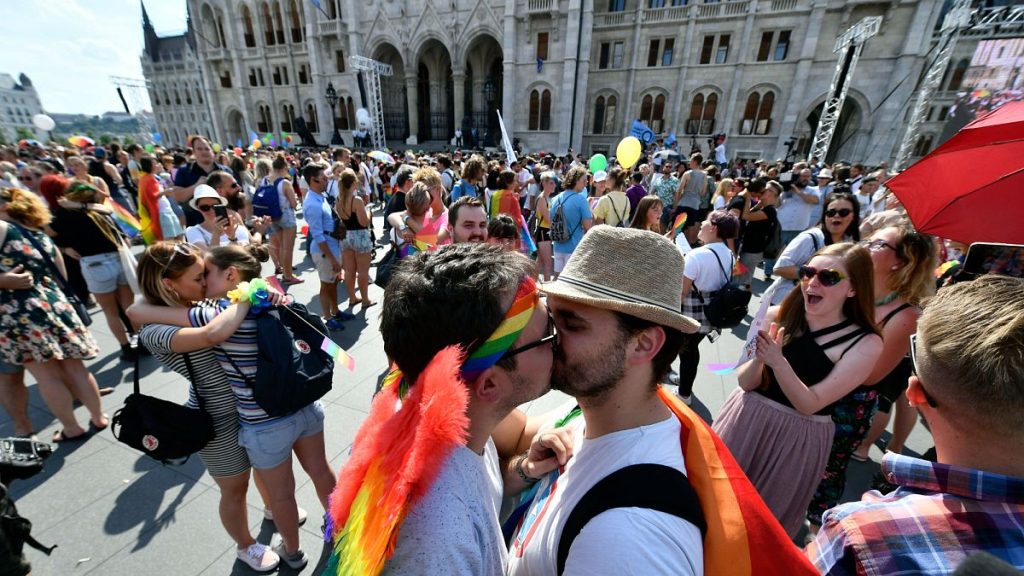In Budapest, the local police department has officially denied a request to hold an LGBTQ+ event, citing a recent legislative shift by the right-wing government that aims to ban such gatherings. The decision follows the passing of controversial laws allowing the authorities to prohibit public events related to LGBTQ+ communities. This situation continues to escalate, underlining increasing tensions and concerns over human rights in Hungary.
| Article Subheadings |
|---|
| 1) Overview of the Event Ban |
| 2) Legislative Background |
| 3) Police Justifications for the Ban |
| 4) Responses from Organizers and Advocacy Groups |
| 5) International Reactions |
Overview of the Event Ban
On a recent Tuesday, the Budapest Police issued an order that effectively banned a requested LGBTQ+ event, illustrating a troubling trend against the community in Hungary. The event was scheduled for June 28, but authorities viewed it as a potential violation of new laws recently enforced by the government aiming to limit public LGBTQ+ gatherings. This decision not only affects this specific event but raises critical questions regarding the right to assembly and freedom of speech in Hungary.
Legislative Background
The ban is rooted in a series of legislative actions taken by Hungary’s Parliament earlier this year. In March, lawmakers passed a measure that grants the government authority to disallow public events organized by LGBTQ+ groups, followed by a constitutional amendment specifically targeting such gatherings. Critics, including legal experts and human rights advocates, argue that these legislative measures serve as tools for authoritarian governance, marking a significant regression in Hungary’s commitment to democratic principles and human rights.
Police Justifications for the Ban
The Budapest Police articulated their justification for the ban, stating concerns about potential illegal activities that could involve minors. They argued that “it cannot be ruled out, or is even inevitable, that a person under the age of 18 will be able to engage in legally prohibited conduct” should they attend the march. The authorities further expressed fears about the potential for “passive victims,” suggesting that minors could inadvertently become involved in activities they did not wish to partake in, given the public nature of the planned assembly.
Responses from Organizers and Advocacy Groups
The decision has sparked outrage among organizers and human rights advocates. In a statement, the event coordinators described the police’s ruling as “a textbook example of tyranny.” Notably, Áron Demeter, a spokesperson for Amnesty International and one of the event organizers, deemed the police’s actions as legally absurd, emphasizing that the ban undermines the very essence of freedom of expression. Furthermore, this decision has broader implications, as it carries significant penalties, including fines for anyone found organizing or participating in any unauthorized events.
International Reactions
The international community has reacted strongly to Hungary’s latest legislative actions. A coalition of at least 20 European Union member states, including countries such as France, Germany, and Spain, has urged Hungary to review its recently adopted policies. Critics argue that these measures contradict core European values of human dignity, freedom, and equality, enshrined in the treaties that bind EU nations. The increasing isolation of Hungary within the EU context raises questions about its future commitments to democratic values and human rights.
| No. | Key Points |
|---|---|
| 1 | Budapest Police have denied a request for an LGBTQ+ event scheduled for June 28. |
| 2 | Legislation passed earlier this year grants the government authority to ban public LGBTQ+ gatherings. |
| 3 | Police cited concerns over potential illegal activities involving minors as justification for the ban. |
| 4 | Organizers and human rights advocates have condemned the ban as a violation of freedom of expression. |
| 5 | At least 20 EU nations are urging Hungary to revise its anti-LGBTQ+ policies, emphasizing the need to uphold human rights. |
Summary
The prohibition of the upcoming LGBTQ+ event in Budapest represents a significant escalation in anti-LGBTQ+ policies by the Hungarian government. By invoking newly adopted laws that restrict public gatherings, the authorities are not only stifling freedom of expression but also creating an environment of fear and discrimination against LGBTQ+ individuals. The backlash from both local and international communities emphasizes the urgent need for dialogue and reconsideration of Hungary’s growing authoritarian inclinations. The future of LGBTQ+ rights in Hungary now hangs in a precarious balance, with activists vowing to continue their fight against these restrictions.
Frequently Asked Questions
Question: Why was the LGBTQ+ event in Budapest banned?
The event was banned due to new legislation that allows the Hungarian government to prohibit public LGBTQ+ gatherings, citing concerns about potential illegal activities involving minors as justification.
Question: What has been the reaction of advocacy groups to the ban?
Advocacy groups, including Amnesty International, have condemned the ban, labeling it a violation of freedom of expression and an authoritarian action by the government.
Question: How have other countries responded to Hungary’s anti-LGBTQ+ legislation?
At least 20 European Union nations have expressed concern over Hungary’s legislation, urging the country to revise its policies as they contradict core values of human dignity and equality enshrined in EU treaties.


